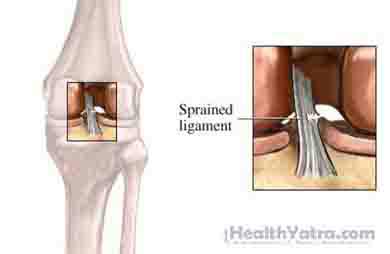Definition
A sprain is an injury that damages a ligament. A ligament is a firm, fibrous band of tissue. It connects two bones across a joint. There are ligaments crossing all of the joints in the body.
Grade 1 and 2 sprains are less severe. The internal structure of the ligament in damaged but the ligament remain intact. Grade 3 sprains are more severe. They include complete tears of the ligament. Grade 3 sprains are sometimes called torn or ruptured ligaments.

The most common joints involved include:
Causes
A sprain occurs when a force pushes the bones of a joint apart. If the force is intense enough, the ligament holding the joint together has to give. Actions that may cause a sprain include:
- Sudden change in direction
- Impact with object or other person
- Misstep that causes sudden strain at joint
Risk Factors
Sprains can occur with everyday activities but are more common during sports. Sports with high speeds and risk of collision have an increased risk of sprains. These sports include:
- Basketball
- Football
- Skiing
- Gymnastics
Symptoms
Symptoms of a sprain may include:
- Pain immediately after the sprain —without treatment, the pain becomes worse over the next 24 hours
- A popping sound
- Local swelling, often within minutes
- Bruising
- Trouble moving the joint
- Increased pain when putting pressure on the injured area
Diagnosis
Your doctor will ask about your symptoms and medical history. A physical exam will be done.
Your doctor may need images of your joint. This will help check for damage to bones or other structures. Images may be taken with:
- X-ray
- MRI scan
Treatment
Treatment will depend on the joint involved and the extent of the injury. Talk with your doctor about the best treatment plan for you. Options include:
Rest
Stop doing activity that causes pain. Protect the joint when possible.
Decrease Swelling
If the leg is involved, elevation will help.
Compression of the area with an elastic bandage helps to control swelling. Do not pull the elastic bandage tight. Release the bandage if fingers or toes become numb.
Ice and Heat
Apply ice to the area for 15-20 minutes at at time. This may be required several times a day for the first few days. Do not apply heat until you are ready to start being more active. Check with your doctor before applying heat. It may increase swelling.
Place a towel between a heat or ice pack and your skin.
Medications
Your doctor may prescribe medication to manage pain and swelling. Medication may include:
- Nonsteroidal anti-inflammatory pain medication, such as acetaminophen or ibuprofen
- Medications that is applied to the skin, may be over-the-counter or prescription
Rehabilitation
Rehabilitation exercises may be helpful once the sprain heals. Exercises can help to strengthen muscles and increase range of motion. Medical help is often needed at this stage. It is very important to strengthen the muscles involving the joint where the ligament is. Those muscles are protection against further injury.
Prevention
It may be difficult to avoid sprains. Joints are at risk during athletic activities. To reduce your chance of getting a sprain, use proper technique to help avoid awkward motions and missteps.
